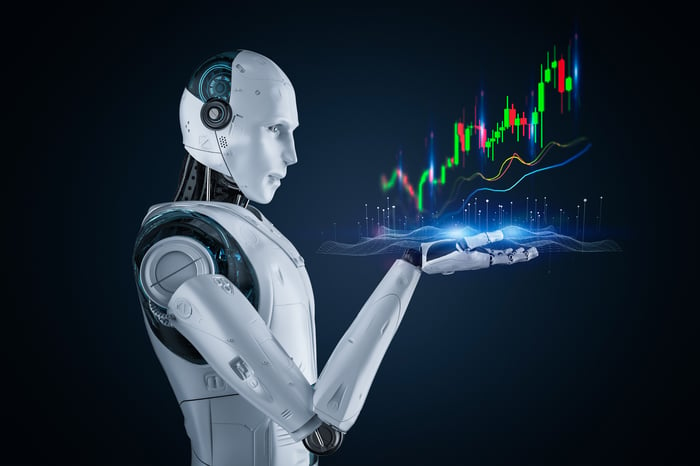ChatGPT's global takeover appears to have hit a bump. After months of rapid growth for the popular artificial-intelligence (AI)-based chatbot, monthly traffic actually declined for the first time ever in June and continued that slide in July.
According to data from SimilarWeb, after reaching nearly 2 billion visits in May, traffic to the site fell 9.7% in June and another 9.6% in July. Similarweb theorized that the drop was due to school being out for the summer and college students taking a break from using the tool.
It noted that Chegg, an education company known for homework assistance tools and online tutoring, also reported sharp declines month over month in June and had said before that it was losing users to ChatGPT. SimilarWeb also said that college-age users make up more than a quarter of ChatGPT's user base, another data point that supports the summer break theory.
The decline presents a concerning prospect for OpenAI's chief sponsor, Microsoft (MSFT -0.01%), and AI investors, more broadly. Is this a sign that AI demand may not be as big as tech leaders thought, or is it just noise? Let's dig into the details.

Image source: Getty Images.
The AI revolution
Just as the slowdown in ChatGPT's user base reveals a gap between its transformative potential and its actual adoption, there also seems to be a bifurcation going on in artificial intelligence between what tech leaders are saying and what the numbers actually show. Across the tech sector, it seems that nearly every CEO is talking up the potential of AI, but most have little to show for it in the numbers.
For example, cloud-computing giant Salesforce (CRM 0.53%) called itself No. 1 in AI customer relationship management (CRM) in its most recent earnings report and talked up its AI potential on the earnings call. However, Salesforce's revenue growth slowed to 11% year over year in its most recent quarter, nearly its slowest growth rate ever, showing that AI is having a negligible impact, so far.
Alphabet (GOOG 0.85%) (GOOGL 0.79%) has also reorganized its business around AI, launching its own AI chatbot Bard, among other moves. However, its revenue growth clocked in at just 7% in the second quarter. Even Microsoft, which has also gone aggressively after AI with its investment in OpenAI, posted modest revenue growth at just 8% in its most recent quarter.
The sluggish growth in the sector is mostly a consequence of the post-pandemic correction that included layoffs at those three companies and others, a sign that they grew too fast during the pandemic boom. With the exception of Nvidia (NVDA -0.46%), the AI chipmaker whose revenue has soared, AI has yet to have a meaningful financial impact in the tech sector.
It makes sense that Nvidia would see a boom as it's selling the building blocks for AI infrastructure. But the impact of AI in the software sector is still a big question mark.
Is there an AI bubble?
It only takes a few minutes of playing with ChatGPT to see the power and potential of generative AI, and it's evident why so many tech leaders believe it will be transformative. But there's a difference between a transformative technology and a winning stock, and investors only have to look at the last major tech transformation -- the beginning of the internet and the dot-com bubble -- to see why it's wise to tamp down expectations.
Most of the hyped-up companies of that era failed to live up to investor expectations, and many went bankrupt. Today's tech sector isn't full of start-ups like in that era, but investors should keep that history lesson in mind as valuations can easily get stretched.
Additionally, emerging technologies can be transformative without creating many winners in the stock market, as Warren Buffett has observed. He commented that the airplane and the automobile were two of the most transformative inventions of the 20th century, yet investing in an early manufacturer would have likely been a poor move as most went bust.
ChatGPT's user decline is a reminder that tech transitions take time, even when their capabilities truly represent a breakthrough. AI investors should be wary of some of the skyrocketing values in the sector as it could take years for the winners in the sector to reveal themselves.





